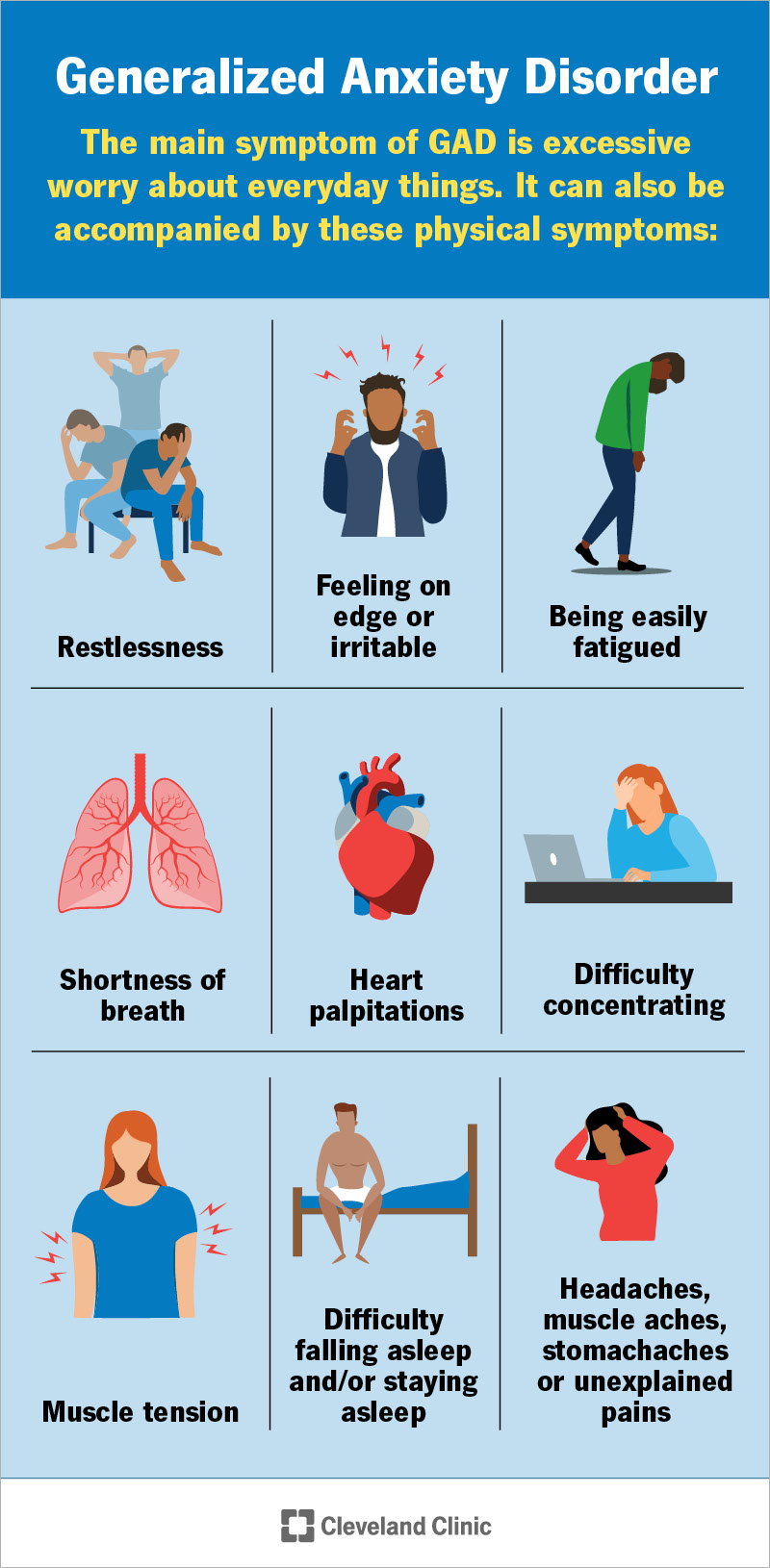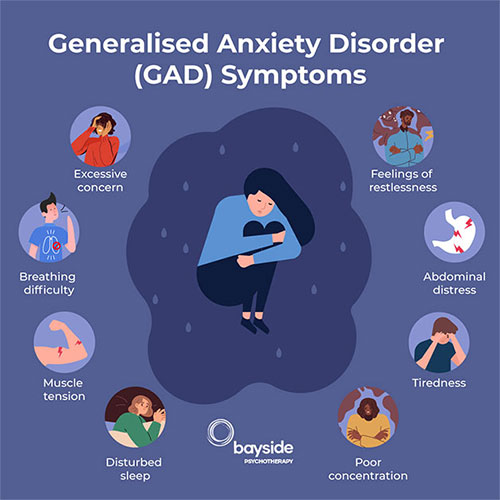How a licensed therapist for anxiety can help you manage daily stress
How a licensed therapist for anxiety can help you manage daily stress
Blog Article
Checking Out Different Techniques in Counselling for Stress And Anxiety Problem for Lasting Change
When taking on anxiety problems, it's important to explore a variety of therapy methods. Each approach offers distinct understandings and tools to aid you manage your signs successfully. You may locate that combining methods can yield the most effective results. Recognizing the nuances of these approaches is vital to promoting long lasting modification. Suppose the appropriate mix could release a brand-new level of emotional well-being for you?
Recognizing Anxiety Conditions: A Brief Introduction
Anxiety conditions, which affect numerous individuals worldwide, can significantly influence day-to-day live. You might experience overwhelming feelings of worry or worry that appear irrepressible. These sensations can cause physical signs like an auto racing heart, sweating, and even dizziness. Common sorts of anxiety disorders include generalized anxiousness disorder, panic attack, and social stress and anxiety condition. Each has distinct signs, but they all share a propensity to interrupt your routine and relationships.Understanding the origin of your anxiousness is crucial. It may stem from genes, mind chemistry, or life experiences. Acknowledging your triggers can aid you handle your feedbacks much better. It is necessary to remember that you're not the only one in this battle. Many individuals encounter comparable obstacles, and looking for assistance is a strong step toward sensation much better. By learning concerning anxiousness disorders, you're currently on the course to understanding and managing your problem better.
Cognitive-Behavioral Therapy: Challenging Adverse Thought Patterns

Recognizing Unfavorable Thought Triggers
When you come across minutes of distress, acknowledging the certain triggers behind your negative ideas can be necessary in handling stress and anxiety. Beginning by focusing on situations that provoke sensations of worry or anxiety. Is it a congested room, a forthcoming due date, or a discussion with specific individuals? Write down these circumstances in a journal. This will assist you identify patterns in your reasoning. Also, notice physical experiences that accompany your negative ideas, like a racing heart or rigidity in your chest. By determining these triggers, you get insight right into what's fueling your anxiety. Recognizing these connections is the initial step in challenging those ideas and ultimately reclaiming control over your psychological actions.

Replacing Ideas With Positives
Challenging negative thought patterns is an essential action in changing your attitude and reducing anxiousness. You might typically locate yourself trapped in cycles of insecurity or tragic thinking. Rather than letting these ideas determine your sensations, method replacing them with practical choices or favorable affirmations. When you think, "I can't handle this," shift it to, "I can handle difficulties one step at a time." This basic adjustment can substantially influence your mood. Regularly identifying and countering these negative thoughts helps create a much healthier inner dialogue. Remember, it takes time and effort, however constantly exercising this method can cause enduring modification, equipping you to deal with stress and anxiety with renewed confidence and resilience
Structure Coping Approaches With Each Other
Replacing unfavorable thoughts is only the start of taking care of anxiousness properly. To develop enduring modification, you need to develop coping methods that equip you. Cognitive-Behavioral Therapy (CBT) helps you identify and challenge those purposeless idea patterns. With each other, you and your therapist can explore just how these thoughts effect your feelings and behaviors.Start by developing functional strategies, like journaling or mindfulness workouts, that enable you to challenge anxiety head-on. When you face your concerns progressively, you'll find out to react in a different way.

Mindfulness and Acceptance-Based Approaches: Cultivating Present-Moment Understanding
As you navigate the complexities of stress and anxiety, integrating mindfulness and acceptance-based techniques can considerably enhance your capability to grow present-moment recognition. By concentrating on the present moment, you'll discover that you can observe your ideas and sensations without judgment. This technique aids you recognize your stress and anxiety without feeling overwhelmed by it.Engaging in mindfulness exercises, such as deep breathing, body scans, or assisted reflections, enables you to ground on your own in your current experience. Acceptance-based techniques encourage you to welcome your feelings as opposed to battle versus them. When you accept your feelings, they lose their power over you.Incorporating these practices right into your daily regimen can transform how you react to anxiety. You'll establish durability and learn to browse demanding scenarios with better ease. Ultimately, growing present-moment recognition lays the structure for enduring modification, equipping you to lead a more fulfilling life.
Exposure Therapy: Facing Concerns Progressively
Direct exposure therapy aids you challenge your worries in a progressive means, making it much less overwhelming. You'll find out techniques to face anxiety-provoking circumstances detailed, while also constructing coping methods to handle your responses. This strategy encourages you to take control and reduce anxiousness with time.
Steady Direct Exposure Techniques
When dealing with anxiousness, gradually facing your worries can be a powerful method to restore control. This method, referred to as steady click this site exposure, involves gradually subjecting on your own to the scenarios or objects that cause your anxiousness. Beginning with much less daunting scenarios and gradually work your method as much as even more difficult ones. If you're scared of public speaking, you might begin by speaking in front of a mirror, after that proceed to sharing ideas with a close friend, and at some point resolve a tiny team. Each step helps desensitize you to the worry, building your confidence with time. Remember, it's vital to speed yourself and celebrate tiny triumphes as you relocate with this process, reinforcing your capacity to take care of stress and anxiety successfully.
Building Coping Strategies
Structure reliable coping methods is vital for managing anxiety, specifically as you face your worries gradually. One effective technique is exposure treatment, where you start by encountering your concerns in a controlled manner. Start with less frightening circumstances and slowly function your way approximately more challenging circumstances. This progressive direct exposure assists desensitize you to anxiety activates, making them less overwhelming.Incorporate leisure techniques, such as deep breathing or mindfulness, to relax your mind during direct exposure. Track your development, commemorating little triumphes along the method to boost your go right here self-confidence. Remember, it's fine to take your time; the goal isn't excellence but consistent improvement. By developing these strategies, you'll equip on your own to navigate anxiousness and embrace learn the facts here now life a lot more fully.
Psychodynamic Therapy: Revealing Root Reasons of Anxiousness
Psychodynamic therapy discovers the unconscious mind, exposing the source of your stress and anxiety - Counseling services for anxiety. By analyzing your ideas, feelings, and past experiences, this technique helps you uncover underlying disputes and unsolved issues that might add to your current stress and anxiety. You'll collaborate with a specialist to explore childhood experiences, partnerships, and emotional patterns that shape your reactions today.As you get understanding right into these deeper layers of your psyche, you'll start to acknowledge exactly how previous occasions affect your existing actions. This understanding can lead to catharsis, allowing you to process emotions you might have suppressed.Through the restorative connection, you can likewise determine defense reaction that might have created with time, offering a clearer course to change. Ultimately, psychodynamic therapy equips you with the devices to resolve your anxiousness at its core, advertising long-term change in your emotional well-being
Alternative and integrative Methods: Integrating Techniques for Greater Efficacy
Integrating numerous healing methods can improve your journey toward managing anxiousness extra properly. By incorporating components from cognitive-behavioral treatment, mindfulness techniques, and all natural techniques, you can produce a customized technique that addresses your unique needs. For example, you may use cognitive-behavioral techniques to test unfavorable thought patterns while including mindfulness exercises to ground yourself in the here and now moment.Additionally, checking out holistic techniques such as yoga exercise or meditation can advertise relaxation and reduce anxiousness signs. This mix allows you to create better self-awareness and resilience.Experimenting with these diverse approaches can assist you uncover what resonates most with you. Bear in mind, it has to do with finding a synergy that functions, instead of staying with a single technique. This integrative technique not just provides prompt relief however additionally promotes lasting skills for handling anxiousness, empowering you to recover control over your life.
The Duty of Support Solutions: Structure Strength Through Connection
While it could appear that managing stress and anxiety is a singular trip, having a strong support system can play a crucial role in your durability. Bordering on your own with empathetic close friends, family, or support groups produces a secure space where you can openly share your experiences and feelings. When you get in touch with others, you advise on your own that you're not the only one in this struggle.These relationships offer inspiration and can provide practical coping techniques that have helped others. It's likewise a possibility to get viewpoint; close friends can aid you see circumstances differently, reducing feelings of isolation.Moreover, psychological support promotes a sense of belonging, which can considerably relieve anxiousness signs and symptoms. By leaning on your assistance system, you can construct durability and deal with difficulties better. Remember, connecting for aid signifies stamina, and it can make all the difference in your journey towards handling anxiety.
Frequently Asked Inquiries
What Are the Typical Signs of Anxiety Problems?
You may experience restlessness, fatigue, trouble concentrating, irritability, muscular tissue tension, and sleep disruptions. Physical signs can include quick heartbeat, sweating, and shivering. Acknowledging these signs early can aid you seek appropriate assistance and treatment.

The Length Of Time Does Therapy Generally Last for Anxiousness Disorders?
Treatment for stress and anxiety problems normally lasts anywhere from a few weeks to a number of months. It really relies on your individual demands, progress, and the techniques your specialist makes use of to aid you handle your stress and anxiety efficiently.
Can Medicine Be Used Together With Treatment for Anxiety?
Yes, medicine can most definitely be utilized along with treatment for anxiety. Incorporating both approaches commonly boosts treatment efficiency, aiding you manage signs while discovering underlying concerns via counseling. Constantly consult your healthcare copyright for customized suggestions.
Exist Self-Help Techniques for Handling Anxiousness?
Yes, there are several self-help techniques for handling anxiousness. You can exercise mindfulness, participate in regular exercise, maintain a well balanced diet regimen, develop a regular, and make use of deep breathing techniques to help in reducing stress and anxiety signs and symptoms properly.
How Do I Know if I Need Professional Help for Anxiety?
You ought to consider seeking professional help for anxiety if it disrupts day-to-day live, causes significant distress, or if self-help strategies aren't working. Trust your instincts; reaching out can lead to much better coping skills and support. Common kinds of anxiousness problems consist of generalised stress and anxiety condition, panic condition, and social stress and anxiety condition. When you experience moments of distress, recognizing the specific triggers behind your adverse ideas can be crucial in taking care of anxiousness. Changing adverse ideas is only the start of taking care of anxiety effectively. By examining your thoughts, feelings, and previous experiences, this strategy assists you discover underlying disputes and unresolved issues that may add to your existing stress and anxiety. It's also a possibility to gain perspective; close friends can help you see situations differently, reducing sensations of isolation (Counseling services for anxiety).Moreover, emotional support cultivates a feeling of belonging, which can substantially minimize stress and anxiety signs and symptoms
Report this page